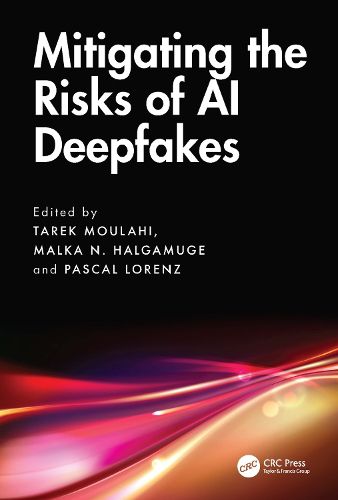Readings Newsletter
Become a Readings Member to make your shopping experience even easier.
Sign in or sign up for free!
You’re not far away from qualifying for FREE standard shipping within Australia
You’ve qualified for FREE standard shipping within Australia
The cart is loading…






Artificial intelligence (AI) has become deeply embedded in modern life, with autonomous systems now controlling many crucial functions in healthcare, transportation, and industry. However, the incredible power of AI also enables new forms of manipulation, deception, and harm. In our proposed book "Safeguarding Our Digital Future: Mitigating the Risks of AI Deepfakes," the chapters explore the dark side of AI and its dangerous implications for human wellbeing.
Spanning over 250 pages, the book examines how attackers can exploit AI systems to spread misinformation, steal identities, endanger lives through faulty diagnostics, and jeopardize public safety through products like self-driving cars. The chapters also dive into the national security risks posed by deepfakes and the use of AI to create compelling fake audio/video content used for political sabotage and blackmail. They explain how deepfakes could be uniquely disruptive in conservative societies that depend on reputation and visual evidence.
While increased reliance on AI delivers efficiency and insight, unchecked development poses catastrophic risks that outweigh the benefits. By assembling a comprehensive overview of the threats we face alongside potential solutions, this book sounds an alarm regarding the dark side of progress while laying out a blueprint for mitigating dangers. The chapters synthesize cutting-edge research on fighting back against AI manipulation through innovations in machine learning, deep learning, reinforcement learning, and federated learning.
Ultimately, "Mitigating the Risks of AI Deepfakes" serves as an essential call to action for consumers, companies, and governments to confront the hazards of AI proliferation head-on. If left unaddressed, the sinister potential of systems we depend on could endanger civil liberties and human life. We must work proactively to guard the public interest as intelligent algorithms grow more advanced. This book equips readers with the knowledge to meet that challenge.
$9.00 standard shipping within Australia
FREE standard shipping within Australia for orders over $100.00
Express & International shipping calculated at checkout
Stock availability can be subject to change without notice. We recommend calling the shop or contacting our online team to check availability of low stock items. Please see our Shopping Online page for more details.
Artificial intelligence (AI) has become deeply embedded in modern life, with autonomous systems now controlling many crucial functions in healthcare, transportation, and industry. However, the incredible power of AI also enables new forms of manipulation, deception, and harm. In our proposed book "Safeguarding Our Digital Future: Mitigating the Risks of AI Deepfakes," the chapters explore the dark side of AI and its dangerous implications for human wellbeing.
Spanning over 250 pages, the book examines how attackers can exploit AI systems to spread misinformation, steal identities, endanger lives through faulty diagnostics, and jeopardize public safety through products like self-driving cars. The chapters also dive into the national security risks posed by deepfakes and the use of AI to create compelling fake audio/video content used for political sabotage and blackmail. They explain how deepfakes could be uniquely disruptive in conservative societies that depend on reputation and visual evidence.
While increased reliance on AI delivers efficiency and insight, unchecked development poses catastrophic risks that outweigh the benefits. By assembling a comprehensive overview of the threats we face alongside potential solutions, this book sounds an alarm regarding the dark side of progress while laying out a blueprint for mitigating dangers. The chapters synthesize cutting-edge research on fighting back against AI manipulation through innovations in machine learning, deep learning, reinforcement learning, and federated learning.
Ultimately, "Mitigating the Risks of AI Deepfakes" serves as an essential call to action for consumers, companies, and governments to confront the hazards of AI proliferation head-on. If left unaddressed, the sinister potential of systems we depend on could endanger civil liberties and human life. We must work proactively to guard the public interest as intelligent algorithms grow more advanced. This book equips readers with the knowledge to meet that challenge.